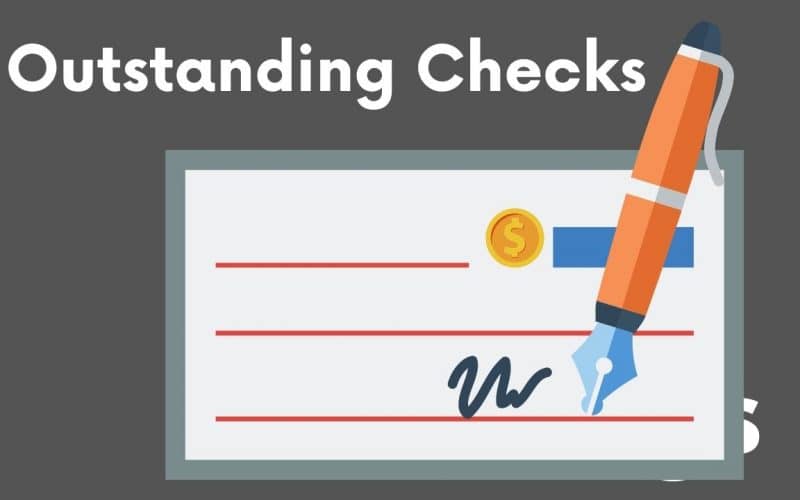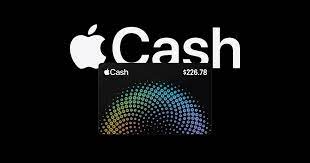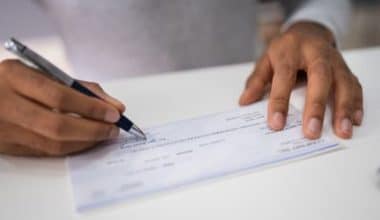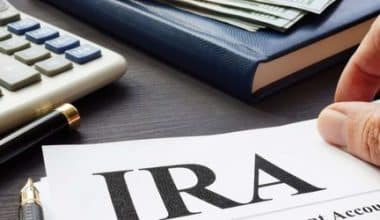One smooth way to pay for a transaction is by check. A check is a financial instrument that allows a bank to transfer money from the payer’s account to the payee’s account. But, when the payee doesn’t cash or deposit the check, the check becomes OUTSTANDING.
What is an Outstanding Check?
An outstanding check is a check that has been made out by someone but has not been cashed or deposited by the payee. The payer is the entity that writes the check, while the payee is the person or institution to whom the check is written. An open check also refers to a check that has been presented to the bank but is still in the bank’s check-cashing cycle.
How Outstanding Checks Work
When the payee deposits the check with a bank, he withdraws the money from the payer’s bank, which in turn takes the amount from the payee’s account and transfers it to the payee’s bank. When the bank has received the full amount requested, it will deposit it into the beneficiary’s account.
A check is opened if the payee fails to cash or deposit the check. This means that the payer’s bank account is not deleted and does not appear on the bank statement at the end of the month. Since the check is pending, it means that the payer remains committed. As soon as the payee has deposited the check, it is compared with the information provided by the payer.
Checks that remain open for a long time cannot be cashed as they will become invalid. Some checks are out of date if they are dated after 60 or 90 days, while others expire after six months.
How to Calculate Outstanding Checks
As seen in money-zine.com: Company Z recorded $200,000 in checks drawn from its general account in the month of December. During the November bank statement reconciliation process, Company Z determined it has a balance of $12,000 in outstanding checks. The bank statement received by Company Z showed checks paid of $196,000 in December. Company Z’s outstanding checks at the end of December would be calculated as:
| Outstanding Checks (Starting Balance) | $12,000 |
| Add: Checks Written | $200,000 |
| Total checks to be paid | $212,000 |
| Less: Checks Paid (Per Bank Statement) | $196,000 |
| Outstanding Checks (Ending Balance) | $16,000 |
What Do You Do with Outstanding Checks?
To resolve these situations quickly, you need to be proactive with pending audits. After all, you still owe the money and sooner or later you will have to pay it. Your first step should be to use an accounting system that will deduct any unpaid checks from your available funds. After that, there are a few more steps you can take to find an old check.
Call or write
Call or email the beneficiaries who don’t deposit the checks and make sure the check was actually received. When they have the check, try to persuade them to deposit the check. If that doesn’t work, send a letter informing payees that the check has not been presented and officially ask them to notify you if they haven’t received payment.
Keep records
Document communications relating to outstanding checks. This documentation is useful when you need to demonstrate to national regulators that you made reasonable efforts to complete the payment. If a pending check is cashed after asking a bank to stop paying, you will need to provide evidence that you took the necessary steps to complete the payment.
Pay online bill
Individuals can reduce surprise withdrawals to personal accounts by paying online bills instead of writing checks.
Online payments provide a more direct way to transfer money between you and the payee. This reduces the risk of complications.
Do You Need to Write Another Check?
After talking to your beneficiary, they can request a new check. Ask the payee to return the old check before sending one to avoid deliberate or unintentional deposit of both checks.
If the original exam is lost or destroyed, you may need to run a new exam without getting the old exam back. This is a difficult situation: there can be two checks in circulation for a single payment. If the old check is on deposit, your bank can cash it and you can therefore pay double that.
Fortunately, banks are not legally required to cash checks that were made out more than six months ago.5 If the old check is less than six months old, or if you want an extra layer of protection, there are two strategies you can use to protect it. .
Stop payment
If the amount is large enough to cause problems, or if you are unsure about the payee, you should ask your bank to stop paying the old check.
There are drawbacks to this strategy: stopping payment requests costs money and only takes six months. If your order is verbal instead of in writing to stop payment, it will only be valid for two weeks. If you’re still concerned about a pending check, you may have to make repeat inquiries.
Find a hit
Ask the payee to sign a document stating that they will not deposit both checks. This doesn’t prevent banks from processing two deposits, but the document can be a useful paper path if you want to dispute one of the deposits.
Why Checks Are Not Cashed
Checks are not deposited for several reasons:
- No urgency: payees sometimes cannot process the check. This usually happens when they don’t urgently need the money to make purchases right away.
- Falling through cracks: checks are sometimes lost. They can be buried under piles of paper or end up behind desks.
- Delivery problems: Checks can be returned to you in the mail if a payee’s address has changed.
Why are Outstanding Checks Subtracted From the Bank?
It can take several days for a check a company sends to a creditor to be emailed, processed and deposited by the creditor, and then cleared from the banking system. As a result, company records may contain some checks that do not appear on the bank statement.
These checks are known as open checks and cause the balance on the bank statement to overestimate the company’s actual cash balance. Since outstanding checks are already on the company’s books as cash withdrawals, they must be deducted from the balance on the bank statement.
How to Avoid Outstanding Checks
Forgotten outstanding checks are a common source of overdrafts. One way to avoid this occurrence is to keep a balanced checkbook. This can help avoid unnecessary NSFs if the payee decides to cash the check at a later date.
You can also call or write to remind the payee that the check is open. This can encourage them to deposit or cash the check. If they haven’t received payment, they may be asked to notify you to reissue the check.
As banking becomes more and more electronic, you can also avoid writing and forgetting a check with the online bill payment service. This should provide real-time information about the total amount of checks outstanding in US dollars and the total amount of dollars in the account.
You should learn about Certified Checks also and How to Get One.
Wrapping Up
If you received a check and it’s still outstanding after six months, contact the check issuer and request a replacement. As mentioned above, you may need to return the original check or sign documents to certify that the check was lost or destroyed. You may also have to promise not to deposit both checks. If you can’t find the issuer, see your state’s abandoned property program to claim assets.






